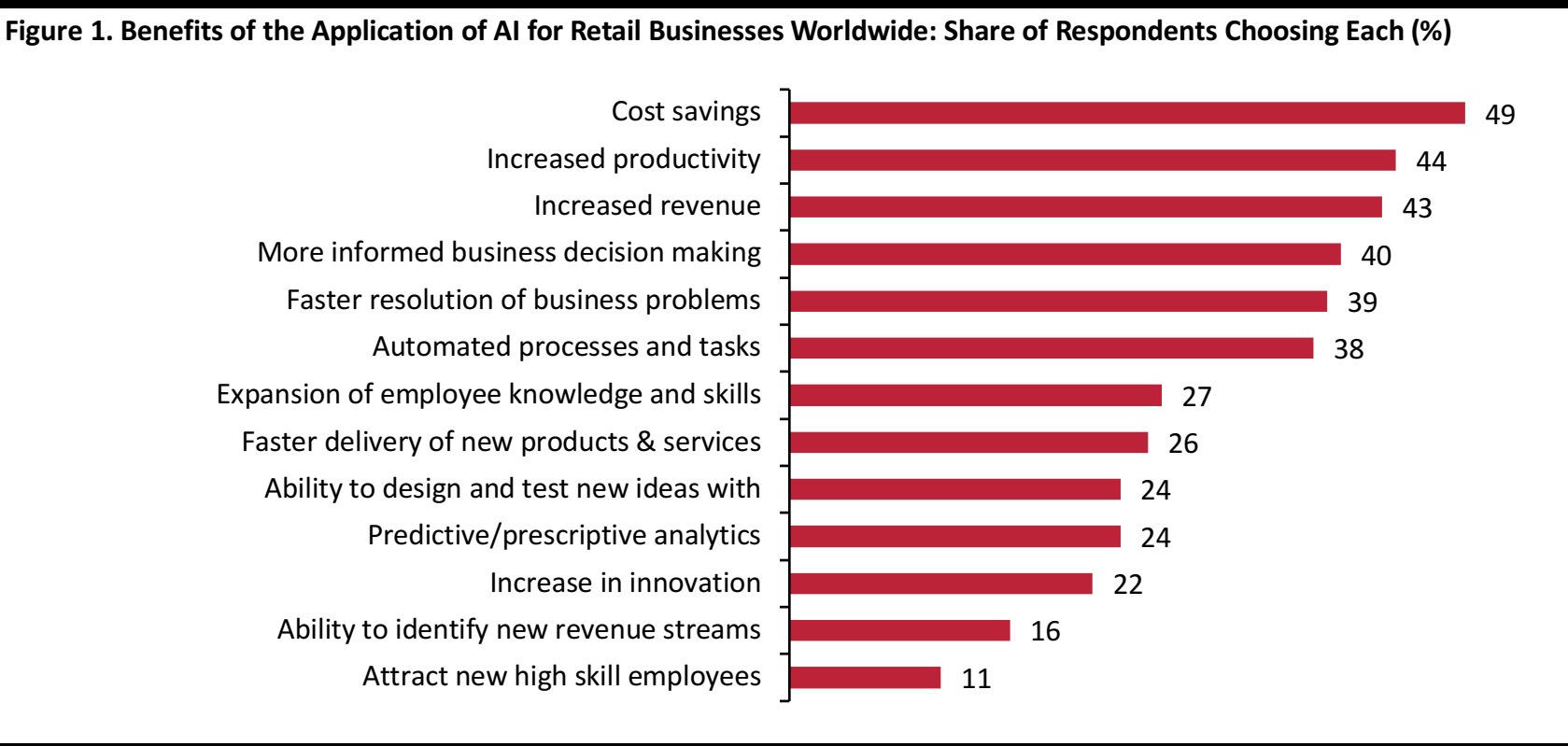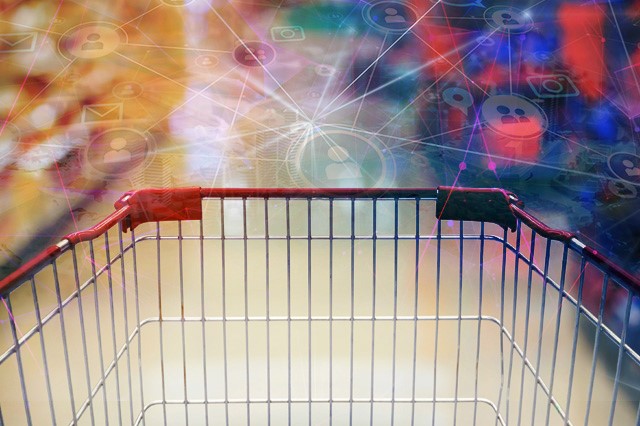Introduction
Two significant collaborations in the retail-tech space have been recently announced, one between US retail giant Walmart and US technology giant Microsoft and another between leading French retailer Carrefour and US technology leader Google. This report gives an overview of the alliances and explains how the two retailers are using the partnerships to further digitalize their retail operations. By introducing new technologies such as artificial intelligence (AI), the Internet of Things (IoT) and cloud-based productivity suites, Walmart and Carrefour aim improve operations and the customer shopping experience.
The digitalization of the retail experience will provide shoppers with new and more convenient ways to shop. This is important for retailers, particularly as they look to compete with e-commerce and technology giant Amazon, which is continually expanding its reach into new categories and markets. The company recently launched its Alexa intelligent assistant in France, posing a threat to Carrefour on the French retailer’s home turf.
The need to reduce costs by increasing efficiency is also driving technology applications in retail. Cost reduction is crucial in the competitive and low-margin grocery business, and retailers are not only using new technologies, but also adopting other strategies, such as purchasing alliances, in order to have more bargaining power.
Walmart Joins Forces with Microsoft for Digital Transformation
On July 17, Walmart announced it had formed a strategic partnership with Microsoft. Aimed at accelerating Walmart’s digital transformation, the collaboration will enable the retailer to introduce cloud-computing, AI and IoT technologies to improve its retail operations.
Walmart is now embarking on a series of cloud innovation projects that leverage machine learning, AI and data platform solutions for customer-facing services and internal business applications. The company stated in an announcement that the effort is designed to enhance the customer experience by providing convenient ways to shop.
Walmart will use Microsoft’s Azure platform to provide cloud-powered checkout on its e-commerce sites. The retailer also plans to build a global IoT platform on Azure to connect heating, ventilation, and air conditioning and refrigeration units in order to reduce energy usage in stores. In addition, Walmart intends to apply machine learning when routing thousands of trucks in its supply chain.
The collaboration with Microsoft will also enable Walmart to empower its associates. For example, the retailer plans to deploy the Microsoft 365 business productivity suite to help employees be more productive.
Carrefour and Google Partner to Foster a New Shopping Experience
On June 11, about a month before Walmart announced its collaboration with Microsoft, Carrefour announced a strategic partnership with Google. The alliance is designed to help Carrefour digitally transform its operations by introducing technologies such as AI, cloud computing, the IoT and new shopping interfaces.
Through the partnership, Carrefour aims to foster a new shopping experience through the AI-powered Google Assistant device, Google Home smart home technology and the Google Shopping e-commerce platform. Carrefour said that its goal is to enable users in France to shop for groceries through these three channels and others by early 2019.
The partnership will also see Carrefour implement Google Cloud, the tech company’s cloud suite, and G Suite, its business productivity platform, in order to foster collaboration and enhance productivity among Carrefour associates.
Finally, Carrefour announced the launch of an innovation lab in Paris as part of its partnership with Google. At the lab, the retailer’s engineers will collaborate with Google Cloud AI experts to develop new ways to improve the customer experience. The research facility is expected to open this summer.
Retailers Invest in Tech to Enhance the Shopping Experience and Lower Costs
While enhancing the customer shopping experience is a main driver behind Walmart’s and Carrefour’s investment in technology and their collaboration with technology partners, the retailers are also looking to reduce costs and increase productivity.
Carrefour, through its collaboration with Google, seeks to offer shoppers new and more convenient ways to shop, which should increase conversion and encourage loyalty among existing customers while also drawing new customers to the company’s banners. The system that Carrefour plans to introduce to French consumers in 2019 should mimic what is already available to Amazon customers, i.e., it should enable Carrefour customers to order groceries via Amazon’s Alexa intelligent assistant.
The Carrefour-Google collaboration follows Amazon’s further moves into grocery in France. On March 26, French retail giant Groupe Casino announced that its Monoprix chain would start selling groceries to customers in Paris through Amazon Prime Now service, signaling another threat to Carrefour in the French grocery market.
The partnership also follows the June 2018 launch of Amazon Echo devices in France.
As we recently noted, tech companies’ ownership of the voice channel forces retailers wanting to offer voice commerce to collaborate with those tech firms.
Investment in technology will undoubtedly help Walmart and Carrefour provide a better customer experience, but it will also enable them to improve operational efficiency, which should result in cost savings, increased productivity and, in turn, improved margins. The graph below helps illustrate this point: it shows the responses to a question about the benefits of AI in retail that appeared in a January 2018 survey conducted by the Consumer Technology Association. Survey respondents rated cost savings and increased productivity as the technology’s key benefits in retail.

Source: Consumer Technology Association
The Consumer Technology Association did not disclose the number of respondents to its survey or the criteria that it used to screen respondents. However, in our view, the graph above shows a sensible representation of what motivates retailers to invest in technologies such as AI when digitalizing their businesses.
Investing in technology is just one of the ways that retailers are trying to improve margins. Another is forging purchasing alliances with other retailers in order to gain more bargaining power with suppliers.
On April 30, Walmart announced the merger of its British subsidiary, Asda, with UK rival Sainsbury’s. The operation will create a supermarket giant with significant bargaining power with suppliers. A few days earlier, on April 25, Carrefour announced a five-year purchasing deal with French supermarket operator Système U to officially favor French agricultural producers. And on July 2, Carrefour announced that it intends to enter a strategic alliance with British retailer Tesco to cover the two companies’ relationship with global suppliers.
Other retailers have also recently announced buying alliances. For example, French retail giants Auchan, Casino and Schiever announced an alliance with German retailer Metro on June 29. The agreement will see the launch of a new purchasing platform called Horizon that will allow the retailers to coordinate purchases both inside France and abroad.
Key Takeaways
Walmart’s and Carrefour’s recently announced collaborations with Microsoft and Google, respectively, are intended to help the retailers further digitalize their operations. By applying the latest technologies—AI, the IoT and cloud computing—the companies seek to become more competitive by enhancing the shopper experience, improving operational efficiencies and reducing costs.
Amazon’s continuing expansion into new product categories and geographies is supported by its in-house expertise in both retail and technology, but most legacy retailers must source tech expertise from external firms. In our view, it is highly likely that other retailers will follow the example of Walmart and Carrefour in collaborating with tech companies that can help the retailers further digitalize their businesses.

